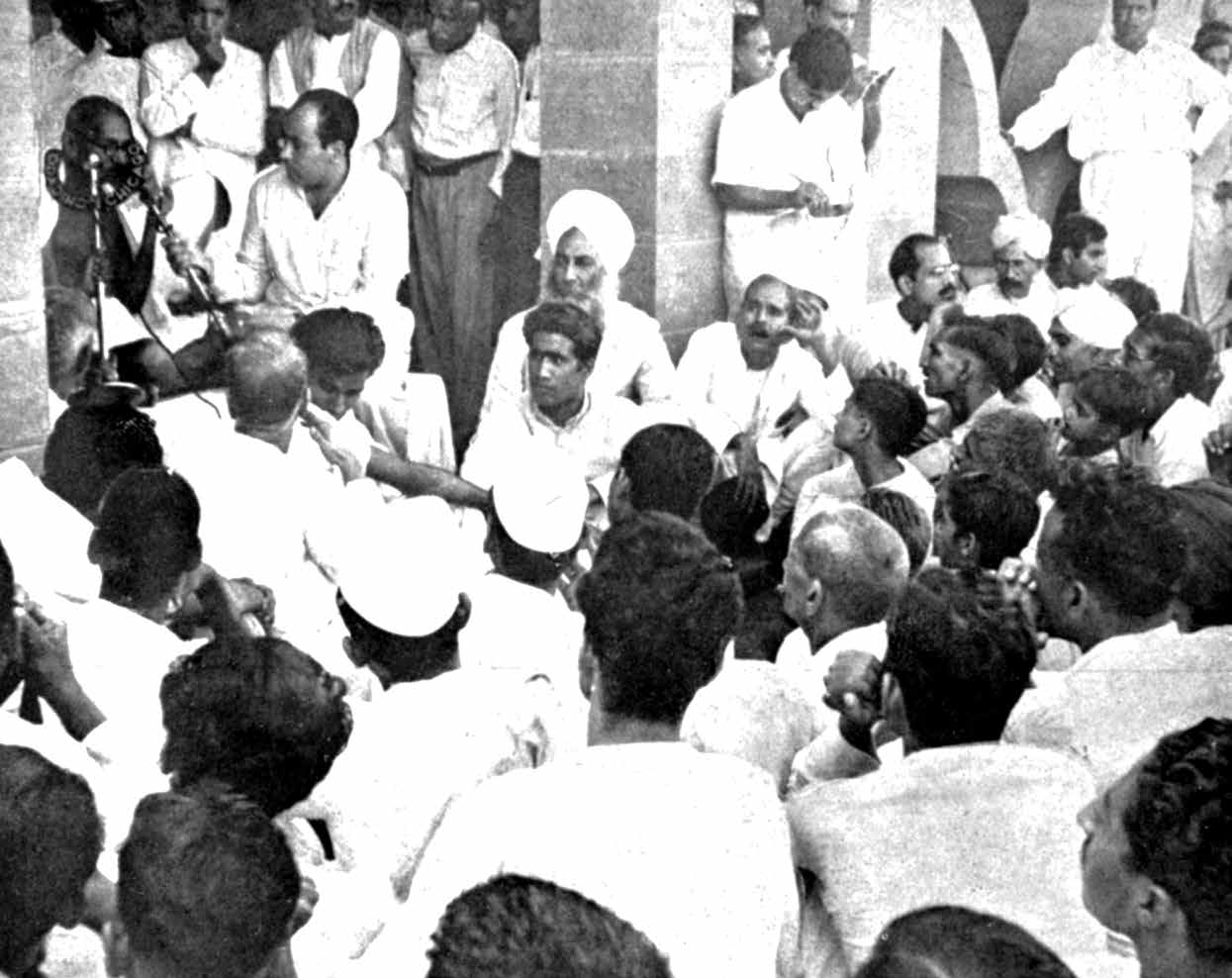
Some men changed their times...
One man changed the World for all times!
Comprehensive Website on the life and works of
Mahatma Gandhi
+91-23872061
+91-9022483828
info@mkgandhi.org

+91-23872061
+91-9022483828
info@mkgandhi.org
Revisiting Gandhiji to arrive at a 'New Normal' |
- Dr. Anil Kakodkar* Mahatma Gandhi delivering a post-prayer speech in the garden of Birla House, New Delhi, January 1948. Covid-19 pandemic has led to a lot of rethinking about socio-economic framework that we have woven around us and its consequences during normal as well as abnormal times. Everyone is talking about the new normal that is expected to set in the post pandemic period, although the visualisation of that new normal seems to vary depending on the lens one has put on. Some scenarios that we have witnessed in recent times have however been very disquieting and should lead to a more universal consensus on the way forward. Creating more jobs in the rural domain is one such thing. Distress reverse migration of crores of people back to their villages for the fear of survival in cities that provided them their livelihood for years and decades has raised serious questions about the unstable societies that we seem to have created around us. Human to human connect that is tending to be more virtual than real is another factor that is also very disquieting, so much so that some succumbing to the virus have had to embark on their last journey without their near and dear ones anywhere around them. The list of such troubling scenarios thrown up by the pandemic is long. Humans in contrast to all other living species on the earth have acquired special abilities to think and innovate. While there is bound to be some diversity in the abilities of individuals in this context, the fact remains that the socio-economic environment in which humans grow and the experiences they go through, largely determine the capabilities and behavioural patterns that the individuals develop. It is thus important that everyone, without any active or passive discrimination, gets a conducive environment to learn, develop and become a capable and responsible human being. Unfortunately, the reality is quite different and there is a wide variation in opportunities to learn and build capability as a result of non-universal access to relevant facilities or the absence of the right eco-system. Villages are particularly at a disadvantage in this context. The capable ones as they progress in life tend to become a part of an exploitative framework leading to the exploitation of the weaker fellow human beings, knowingly or unknowingly. The same framework also leads to disproportionate degradation of nature and depletion of its resources. The human intelligence while leading to this world becoming a better place, has not fully contained the human greed or the animal instinct in humans. Large disparities seem to be the result with earth rapidly approaching the tipping point even as the economies grow. Social and economic frameworks that we have built around us have only contributed to this exasperating situation rather than ameliorating it. It takes extreme events like the pandemic to bring home the bitter truth related to the disaster in waiting. Covid-19 pandemic has exposed the fault lines in our society in a very stark fashion. It seems to me that Gandhiji had visualised this situation while developing the societal framework for independent India and had in fact comprehensively experimented with concepts like ‘sarvodaya' and ‘gramodaya'. Unfortunately, we did not adequately listen to him. Growing disparities in the form of several divides such as rich-poor, urban-rural etc. have resulted even as economy grew. The socio-economic instabilities seem to be arising because of several factors. A larger segment of humanity has been left behind for want of adequate access to meaningful education, capacity building and ability to leverage increasingly complex technologies. As a consequence, a significant asymmetry in the value addition capabilities of different segments of the society seems to have taken place. We seem to have created a rather unrestrained access to markets everywhere without being too much concerned with creating a level playing field for all segments of society to be empowered with competitive value addition capabilities. This differential value addition capability has led to serious disparities and divides. Migration of population from rural areas to urban areas is clearly a manifestation of such an increase in disparities. The key to redressal of this situation lies in insightful attention to villages, following the teachings of Gandhiji interpreted in today's context. ‘Grama swawalamban' - village self-reliance, seems to be the most important among them. It seems to me that in the contemporary knowledge era, there are greater livelihood opportunities in villages as compared to cities. In addition to agriculture and allied activities, where villages have a natural advantage, one can significantly benefit from digital and newly emerging exponential technologies including decentralised manufacturing in villages much the same way as in cities. We must recognise that the knowledge technologies that dominate the contemporary era, promote decentralisation as well as democratisation. Technology access, training and capacity building; education, research and technology development; and a holistic eco-system in villages encompassing knowledge, technology, livelihood and human sensitivity would however be a pre-requisite to creating such higher opportunities in villages as compared to cities. We need to convert villages as small and vibrant human settlements in a Digital Society of 21st Century. I call that Cillage - a Digital City in a Modern Village. Such a cillage would be self-reliant, net exporter and competitive with no fear of job loss with onslaught of new technology. With bridging of the divides that cillages would bring about, we should be able to make the world free from instabilities. Most importantly, such a cillage would be consisting of people sensitive to people around them in the spirit of Narasi Mehta Bhajan which Gandhiji liked most: वैष्णव जन तो तेणे कहिये Courtesy: Khoj Gandhiji ki, September 2020 * Chairman, Gandhi Research Foundation, Jalgaon. |